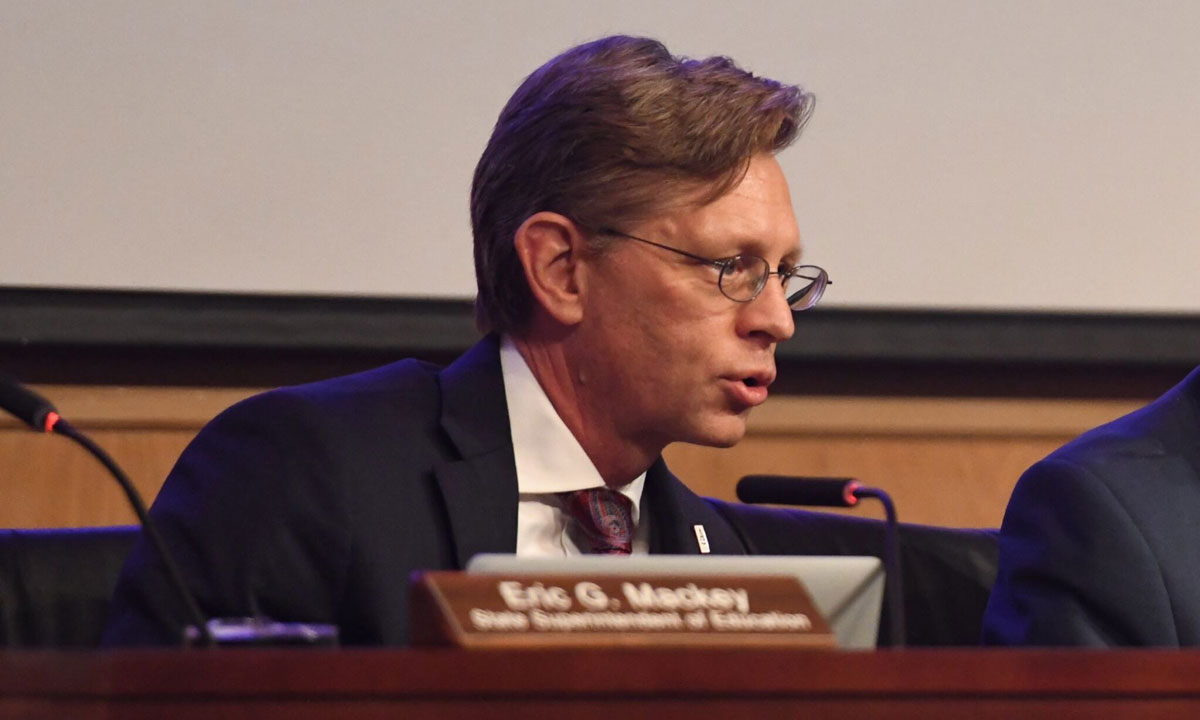Alabama Department of Education Wants to Boost Literacy in Later Grades
The department is seeking $22 million to help students in fourth to sixth grades.

Get stories like this delivered straight to your inbox. Sign up for The 74 Newsletter
Having spent years focusing on reading skills for early elementary school students, the Alabama State Board of Education is seeking funds to boost literacy after third grade.
The State Board of Education on Oct. 12 approved a budget request for “struggling readers beyond grade 3” for $22 million. Last year, the Board had requested $3 million, but did not receive any funding for the program.
State Superintendent Eric Mackey said during the September work session that the earlier program had been a small one for a small number of students. The rest of the board members wanted to see something larger.
The $22 million would go to professional training for teachers. Mackey said in a phone interview they’ve heard from superintendents that they want an equivalent professional development for teaching literacy for teachers from fourth to sixth grade, like kindergarten through third grade under the Literacy Act.
“Some of them are already doing it but this would give us a chance to really expand that,” he said.
The Alabama Literacy Act, passed In 2019, aimed to get all students reading on grade level by the end of third grade and boost overall literacy scores in the state. The bill provides funding for teaching training and reading coaches to ensure students master reading. Students that are not reading at grade level by the end of third grade could be held back a year.
At the September work session, Mackey said that the department need funding for readers beyond third grade because the law states that Alabama Reading Initiative funds cannot be used beyond that point.
But students don’t stop struggling with reading after third grade.
Vicky Askew, a reading specialist with Tallapoosa County Schools, said that continuing reading instruction past the third grade is important. She said that some students in her system are getting reading intervention in fourth and fifth grade, if they have enough instructors who work with at-risk students in learning literacy.
“I feel like they need it because we can’t just say, ‘Oh, they’re in fourth grade: Good luck,’” she said.
House Ways and Means Education chair Danny Garrett, R-Trussville, said he was not familiar with the specific request in the board’s budget, but he supports literacy.
“Reading is a priority for the Department of Education and also for the Legislature,” he said.
Rep. Terri Collins, R-Decatur, the chair of the House Education Policy committee and the sponsor of the Literacy Act, said Tuesday she has not looked into what exactly the board is asking for, but she said she was happy to hear about the request.
“I think that we will see a large group in summer school this year which is one of the ways to go ahead and move towards promotion, which is what we want for all of the students but we want to make sure that they’re reading,” she said.
Collins said that having teachers know how to teach the science of reading, a body of research about learning literacy, is a good thing.
In the National Assessment of Education Progress, or the “nation’s report card,” scores released in 2022, Alabama improved relative to many other states due to learning loss in other states. Alabama’s own scores were relatively stagnant and remained below average.
NAEP proficiency is not equivalent to Alabama grade level.
Mackey told the Montgomery Advertiser in 2022 that the department had been focused on elementary grade level scores for a while and middle school had not received as much attention.
Mackey said this funding is part of a focus on the middle school years. He said the Numeracy Act, which focuses on math improvement, looks at grades kindergarten through eighth grade. The Literacy Act, he said, also discusses intermediate years.
“It’s just that it’s not funded, so we’re asking for some funding,” he said.
The education budget is first reviewed by the governor, who will make a funding request to the Legislature when the Legislature returns for its regular session in February. Mackey said he doesn’t know what the grand total for the Education Trust Fund will be.
He said that their roughly $6.2 billion request, which is just for kindergarten through twelfth grade, is probably more than will be allotted.
Higher education funding also comes from the Education Trust Fund but is not included in the department’s request.
Later, he said, the department will work with executive offices on a real budget number to identify priorities and how funding is allocated.
Mackey said their role is identifying needs in schools, not balancing the budget.
“So we’ve identified needs, and we’ve asked for a lot,” he said.
Alabama Reflector is part of States Newsroom, a network of news bureaus supported by grants and a coalition of donors as a 501c(3) public charity. Alabama Reflector maintains editorial independence. Contact Editor Brian Lyman for questions: [email protected]. Follow Alabama Reflector on Facebook and Twitter.
Get stories like these delivered straight to your inbox. Sign up for The 74 Newsletter

;)